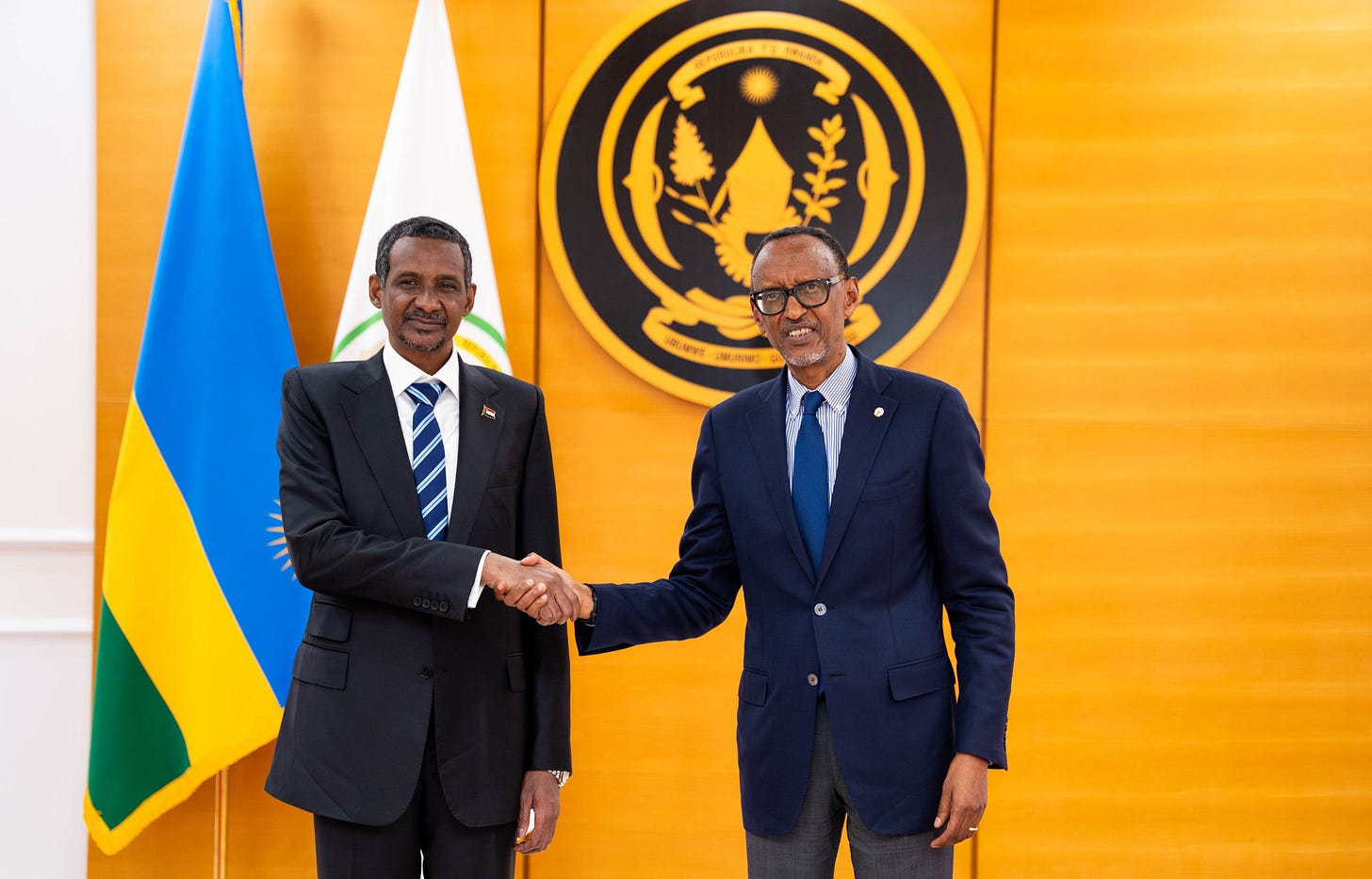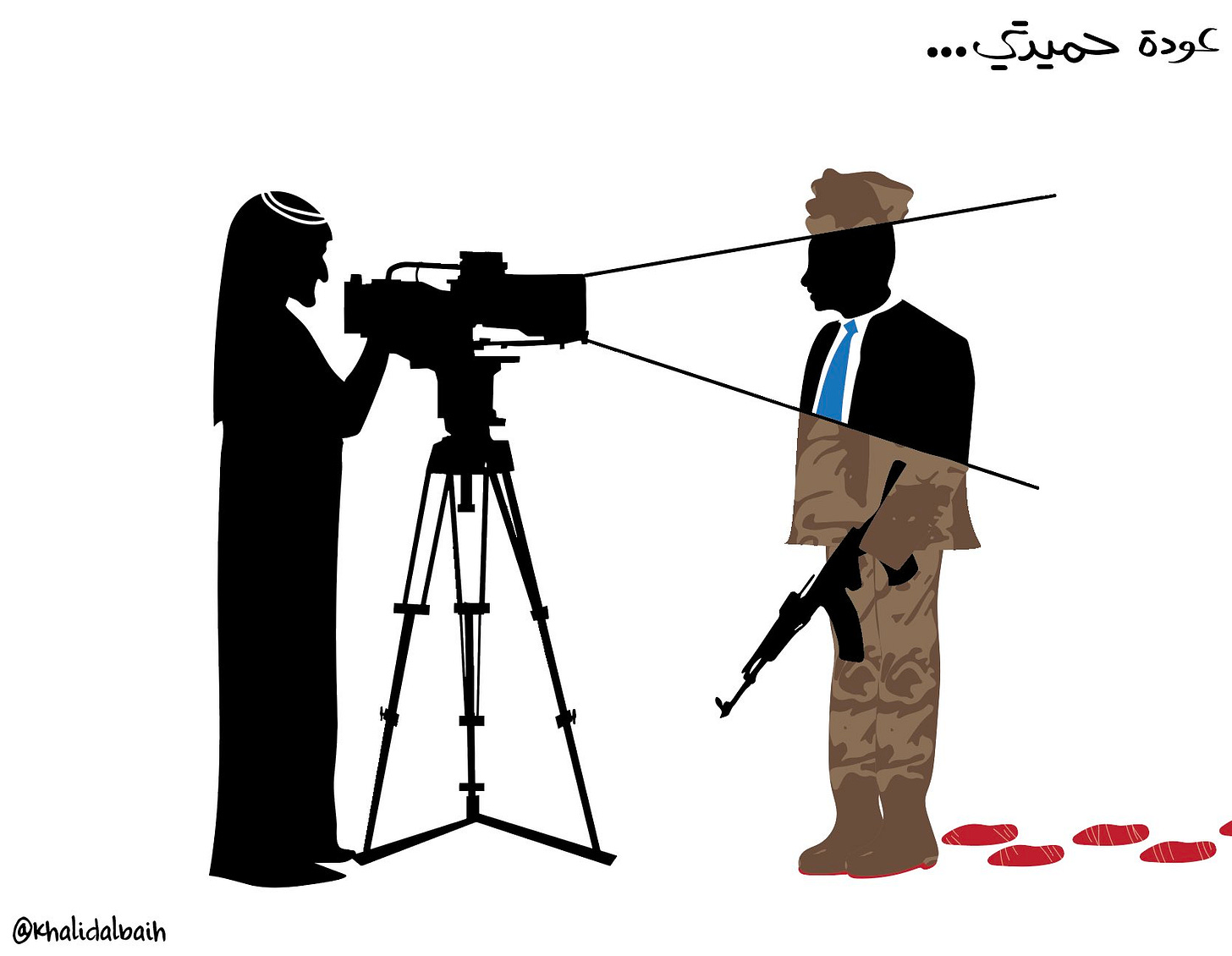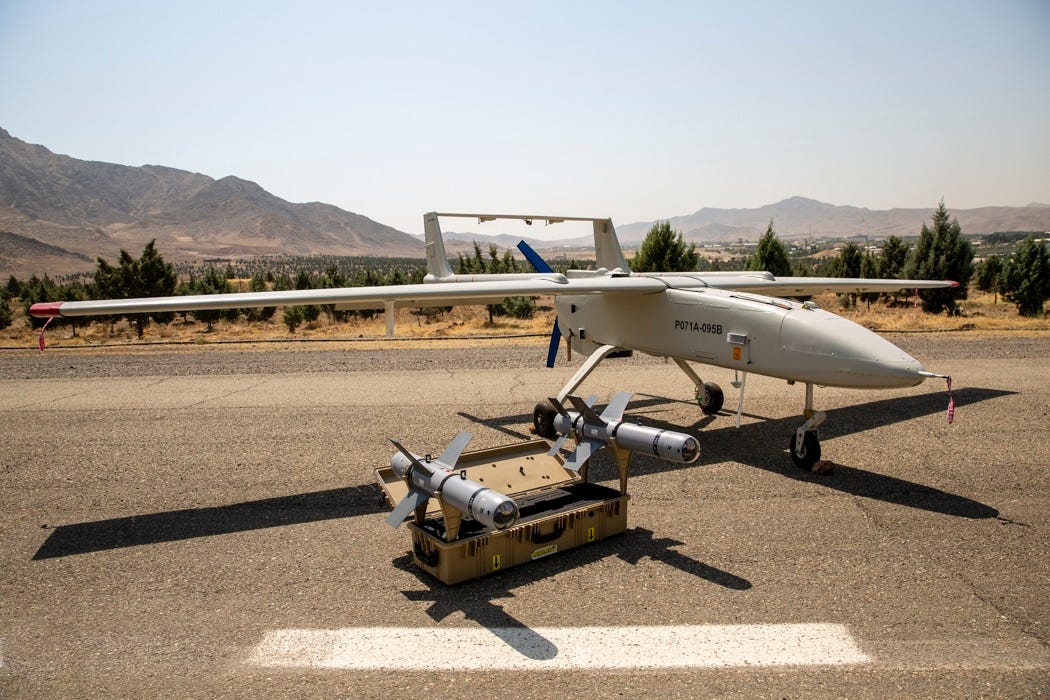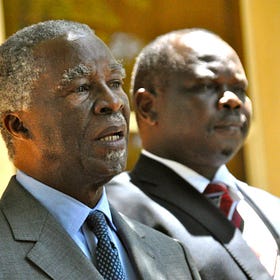RSF leader visits Rwanda genocide memorial
Dagalo says, "We must learn from Rwanda"
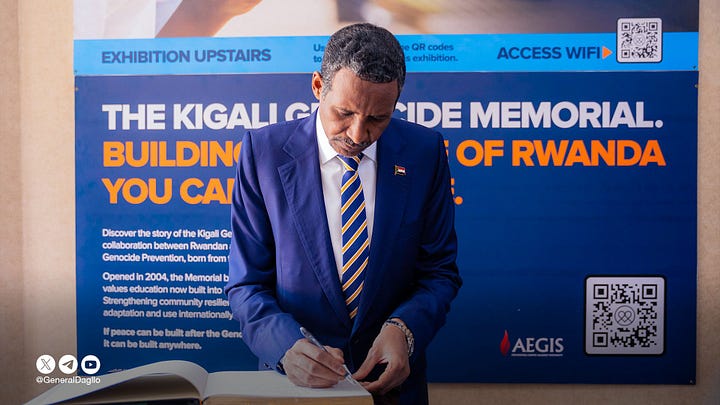

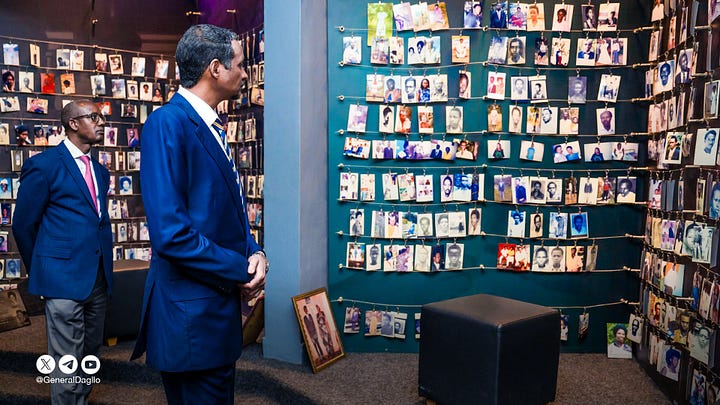
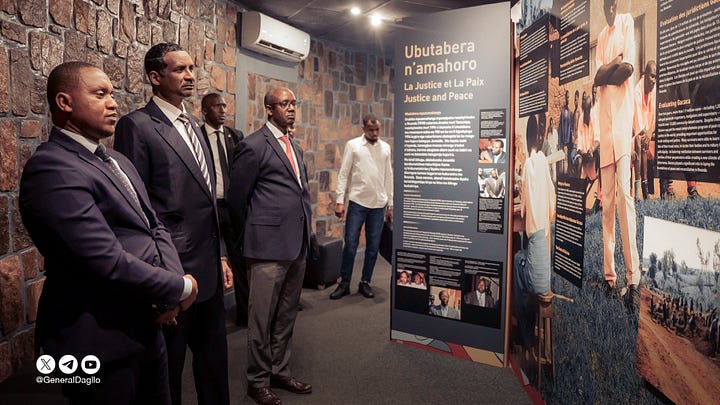
Mohamed Hamdan Dagalo, a long-time commander of Darfur militias known as the ‘janjaweed,’ and now the leader of the Rapid Support Forces (RSF), visited the Kigali Genocide Memorial, which commemorates the Rwanda genocide of 1994.
Dagalo’s RSF stands accused of genocide against the Masalit ethnic group during violence in West Darfur last year—a near repeat of what happened in the same region twenty years ago, albeit not at the same scale.
Dagalo’s RSF is vying for power with the Sudan Armed Forces (SAF), headed by Abdel Fattah al-Burhan, who undertook his own foreign tour several months ago. The RSF’s leader’s tour has already eclipsed al-Burhan’s, at least in Africa—a stunning public relations success for a paramilitary leader rather than a head of state.
Dagalo began his tour December 27 with a meeting with Uganda’s President Yoweri Museveni. He proceeded to Ethiopia the next day and onward to Djibouti on December 31, meeting with Prime Minister Abiy Ahmed and President Ismaïl Guelleh.
In Kenya, President William Ruto rolled out the red carpet for Dagalo January 3, receiving him as a visiting head of state. This prompted Sudan to recall its ambassador in Nairobi. Dagalo continued his tour Thursday, meeting with South African President Cyril Ramaphosa. In a tweet, South Africa’s Presidency announced Dagalo as “His Excellency (the) President of Sudan,” before deleting and correcting it.
On Friday, Dagalo arrived in Kigali where he met Rwanda’s Paul Kagame.
In a statement after his visit, Dagalo wrote,
Today I visited the Genocide Memorial Museum in the Rwandan capital, Kigali. It is one of the most important landmarks in human history, as it bears witness to an era of wounds and tragedies that Rwanda experienced during which it lost hundreds of thousands of victims due to racism, hatred, and attempts to monopolize power by force over the people.
The Rwandans alone faced their problems with courage and developed radical solutions to them through the experience of “gacaca”, which is similar to “judiya” in Sudan. This practice established the principles of justice and transitional justice in society, achieved the concept of non-impunity, and changed the course of its history from division to unity, from hatred to love, and from war to peace and sustainable development.
We, as Sudanese, must learn from Rwanda. The war that our country is witnessing today must be the last war, and we must work to create a just and sustainable peace for ourselves and for the future of our coming generations. We must learn from the experiences of others and draw with our own hands the path that leads us to safety.
Such statements, although published in Dagalo’s name, are written by advisors or paid public relations professionals. Dagalo himself has only a third-grade education; when speaking publicly, he struggles to read prepared statements.
In general, Sudanese media and political observers have characterized Dagalo’s foreign tour as a public relations ploy, aimed at polishing his international reputation, rather than a serious attempt to end the war. Some observers suspect the United Arab Emirates of bankrolling and orchestrating the tour. According to open-source flight trackers, the airplane carrying Dagalo and his entourage is owned by Royal Jet, a company based in the UAE capital Abu Dhabi, which operates luxury charter flights.
This cartoon by Khalid al-Baih contrasts how Dagalo (also called “Hemedti”) appears for the cameras (operated by a Gulf Arab), compared to how he behaves off-camera. The text says “Hemedti’s return,” referring to his return to the limelight after eight months in the war zone Khartoum, where he generally kept a low profile.
RSF shoot down Iranian drone in Khartoum
The Rapid Support Forces today shot down a drone over central Khartoum, according to video of the incident and corroborating photos of the debris.
Sudan has operated a small fleet of Muhajer-6 drones since before the war. It acquired some of its drones directly from Iran, while others where produced under license by Sudan’s Military Industrial Corporation.
Today’s shoot-down underscores the difficulty of operating drones in established frontline areas where enemy fighters know where to expect them. The fighter who shot down the drone did so from a rooftop 3.5 km from the army headquarters, which the RSF have besieged since the start of the war.
The army control the headquarters itself, the University of Khartoum, some other government buildings and downtown blocks, and a small adjoining area on the other bank of the river in Khartoum Bahri, around Kober Prison.

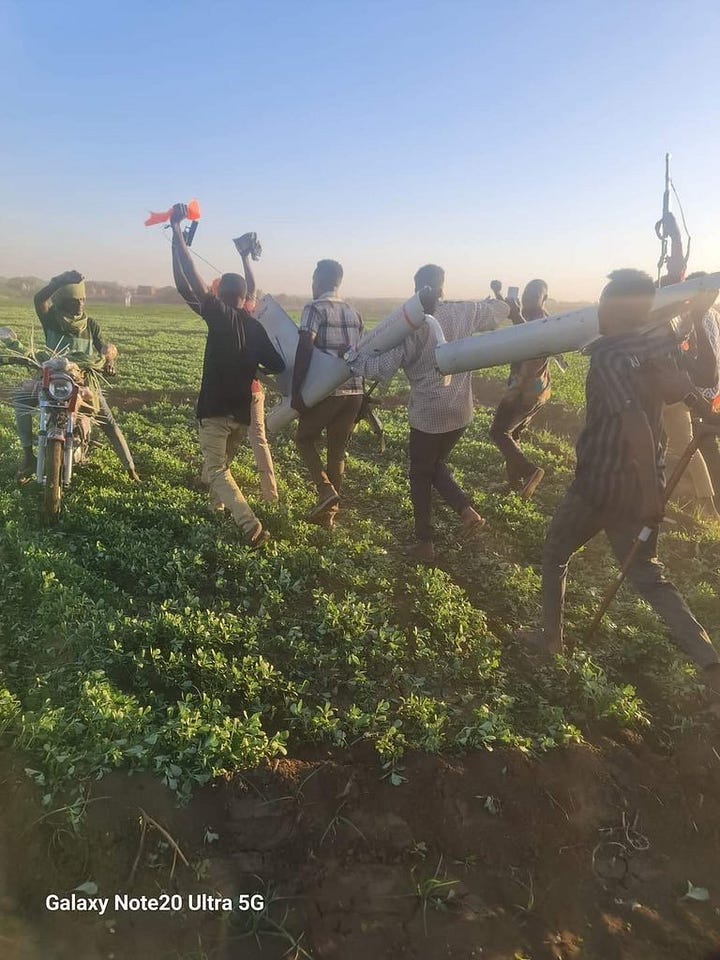

Iran’s limited production capacity coupled with high demand from other customers, including Russia, which has used the Mohajer drones in Ukraine, could make it difficult for Sudan to replenish its fleet of Iranian drones.
In related news, on Friday a suspected army drone carried out a strike on Khartoum Central Market, reportedly killing a number of vendors and civilians. SAF have repeatedly targeted markets in RSF-controlled areas.
Also on Friday, In Wad Madani, five civilians were killed in an airstrike.
Reprisal killings in Dilling
Tensions are high in the city of Dilling in South Kordofan, in which three armed groups are present: SAF, RSF, and SPLM-N. Rumors and fears swept the city several days ago, after an attack on the nearby Habila garrison. This reportedly sparked some reprisal killings, and displacement from some neighborhoods.
In a particularly gruesome incident, one man’s throat was cut and his body was hung up in the market, upside down, allegedly because he was a traitor. According to some reports, he was a sergeant in the Sudan Armed Forces responsible for intelligence.
The act, described as a "crucifixion," was witnessed by crowds of people in the market, including teenage boys and children. We have reviewed a video and photos of the incident.
Similarly, Darfur 24 reported “ethnic-based killings between officers and soldiers of the Sudanese army in the Dilling garrison in South Kordofan state, following the fall of the Habila military region at the hands of the RSF last Saturday.”
One of the sources was quoted as saying to Darfur 24 that widespread violence took place over the past week between soldiers and army officers following accusations exchanged between members of the forces in the Dilling garrison that some were involved in facilitating the mission of the Rapid Support Forces to seize the army’s military base in the Habila area, 40 kilometers southeast of Dilling.
The source, preferring to withhold his name, said that the acts of violence included killing, torture, hanging, and mutilation of bodies after the forces were divided along ethnic lines. While some soldiers fled from the Habila base to take refuge in one of the military bases of SPLM-N headed by Abdulaziz Al-Hilu.
Forces of SPLM-N have arrived in the Al-Toumat neighborhood of Dilling amid cheering from residents, according to a video circulated today.
Hemedti aide threatens to expand war to other states
Speaking to Radio Tamazuj on Thursday, Nizar Saeed Ahmed, a director in Daglo’s office, said the RSF will continue to expand its occupations to seize new areas in Sudan as long as the war continues. “The war will not stop,” he said. Saeed said the matter of attacking a specific area or defending it is up to the military forces present in the field and they can do what they deem appropriate.
Burhan beats the drums of war
Addressing his troops in Red Sea State, SAF commander-in-chief Abdel Fattah al-Burhan reaffirmed his intention to defeat the RSF militarily rather than negotiate, saying, “The whole world witnessed these rebel forces committing war crimes and crimes against humanity in West Darfur and the rest of Sudan. For that reason, we have no reconciliation with them, we have no agreement with them.”
Burhan urged Sudanese to join the military, while also promising to arm civilians who want to fight. This corresponds with a new information campaign by the military media and supporters of Burhan’s government, calling for “popular resistance” by armed civilians and militias operating independently of SAF but alongside it.
“Therefore, we welcome the Popular Resistance, and we will supply them with weapons, and we will not prevent those who support them,” he said.
“The country faces the threat of falling under “bondage and colonialism,” Burhan added, apparently referring to the UAE.
Related coverage
Mbeki: ‘African and international response to Sudan disaster woefully inadequate’
Thabo Mbeki, the former president of South Africa, has called for a more robust humanitarian and political response to Sudan’s crisis. Mbeki is the former chief mediator of the African Union for Sudan…


